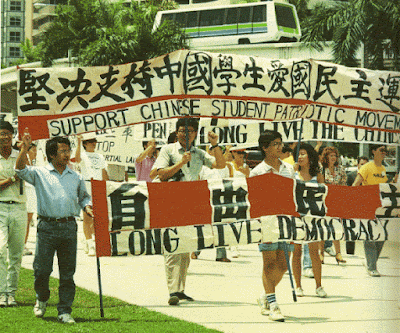In memory of those who stood up for their rights, lost their lives and for those still unjustly imprisoned today in China.
Thirty years ago tonight it began.
The Pro-Democracy Movement that had taken to the streets in April of 1989 was violently crushed by the Chinese communist dictatorship beginning on the evening of June 3, 1989. By dawn on June 4, 1989 scores of demonstrators had been shot and killed or run over and crushed by tanks of the so-called People's Liberation Army.
Thousands more would be rounded up, arrested and sentenced to prison in show trials. As many as a thousand received death sentences that were carried out.
The response of the West and the United States at the forefront? Pro forma protests to satisfy the outrage of their citizens while secretly meeting with the men who had ordered the mass killing to let them know that what was important was their economic relationship.
Two weeks prior to the Tiananmen Square massacre then Chinese leader Deng Xiaoping observed: “Two hundred dead could bring 20 years of peace to China.”
Thirty years ago I was an undergraduate at Florida International University studying biology. The first months of 1989 filled one with hope as events began to unfold favorably in Poland and in the rest of the Eastern bloc. In April mass demonstrations by Chinese students demanding accountability, an end to corruption, and democratic reforms began and seemed to be part of a worldwide democratic wave. In Eastern Europe, with the exception of Romania, the autocrats refused to fire on large gatherings of nonviolent protesters, and in relatively short order they were free.
 |
| Students peacefully demonstrating in Beijing in 1989 |
The Pro-Democracy Movement that had taken to the streets in April of 1989 was violently crushed by the Chinese communist dictatorship beginning on the evening of June 3, 1989. By dawn on June 4, 1989 scores of demonstrators had been shot and killed or run over and crushed by tanks of the so-called People's Liberation Army.
Thousands more would be rounded up, arrested and sentenced to prison in show trials. As many as a thousand received death sentences that were carried out.
The response of the West and the United States at the forefront? Pro forma protests to satisfy the outrage of their citizens while secretly meeting with the men who had ordered the mass killing to let them know that what was important was their economic relationship.
Two weeks prior to the Tiananmen Square massacre then Chinese leader Deng Xiaoping observed: “Two hundred dead could bring 20 years of peace to China.”
 |
| Tiananmen Square in June of 1989 prior to the crackdown |
This was not to be the case in China. The communist Chinese leadership had attempted to order their troops to crackdown on the Chinese students on May 20, 1989 only to have their orders rejected.
 |
 |
| Bodies at Shuili hospital mortuary. All died from bullet wounds. Credit Jian Liu |
 |
| Memorial banner for those martyred in China in June 1989 |
Chinese students from Florida International University (FIU), the University of Miami (UM) and Florida Atlantic University (FAU) organized and carried out a protest march in downtown Miami in the days following the massacre.
 |
| Chinese students march in downtown Miami protesting the June 4th crackdown |
A 2017 declassified British diplomatic cable revealed that "at least 10,000 people were killed in the Chinese army's crackdown on pro-democracy protesters in Beijing's Tiananmen Square in June 1989."
The failure of the Western Democracies to side with China’s democratic forces due to narrow economic interests to trade and subsidize a murderous communist dictatorship was a sobering realization that prepared me for what has been taking place in Cuba.
The behavior of Western tech firms in China, who collaborated with the secret police in identifying dissidents who were rounded up, jailed, tortured and in some cases killed and censoring information on the internet to erase the crimes of Tiananmen, the Cultural Revolution, and the mass famines of the Mao era was a wake up call and prepared us to have a more critical eye when they signed agreements with the Castro regime.
Those days in June of 1989 marked me and impacted the course my life would take. In the years that followed we engaged in acts of remembrance with Chinese students, protested and burned a Chinese flag when a Chinese official spoke at FIU in 1991 and hosted Chinese dissident Harry Wu at FIU.
Elie Wiesel at his Nobel Lecture in 1986 observed: "There may be times when we are powerless to prevent injustice, but there must never be a time when we fail to protest." Bearing witness and taking action continues to be necessary to avoid forgetting. Wiesel in the same lecture explained the consequences of not remembering: "To forget the victims means to kill them a second time. So I couldn't prevent the first death. I surely must be capable of saving them from a second death."
Monday, June 3, 2019
Candlelight Vigil
8:30 PM Victims of Communism Memorial
Corner of New Jersey and Massachusetts Avenues NW
Washington, D.C. 20001
Candlelight Vigil
8:30 PM Victims of Communism Memorial
Corner of New Jersey and Massachusetts Avenues NW
Washington, D.C. 20001
|
|
Please join us at the US Capitol for a rally to commemorate the 30th anniversary of the Tiananmen
Square Massacre and to highlight the continued suppression of the
Chinese people by the Chinese Communist Party. Speakers will include
witnesses of the Tiananmen Square Massacre in
1989, activists, and policymakers, including VOC Caucus Co-Chair Rep.
Chris Smith (R-NJ) and Co-Chair of the Congressional-Executive
Commission on China Rep. Jim McGovern (D-MA).






No comments:
Post a Comment